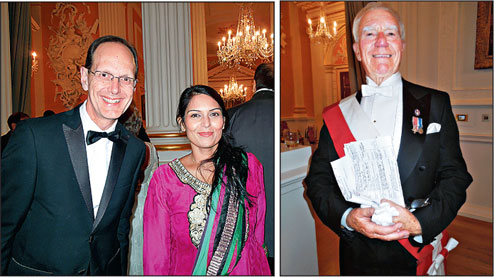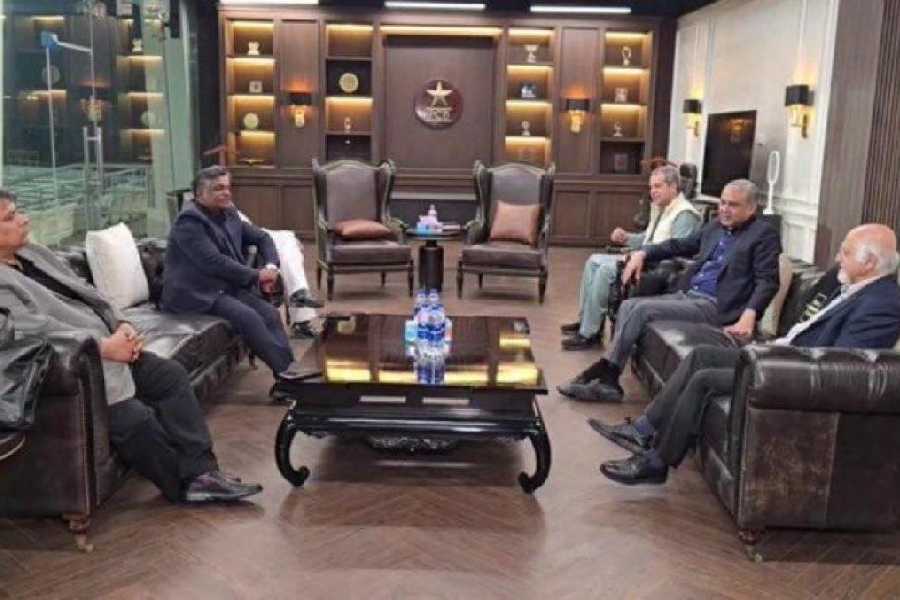Glorious banquet for ‘unbeatable combination’

When you have been brought up in such modest circumstances as I was in Patna, you are impressed with the grandeur of the Mansion House in the City of London.
This was where the Confederation of British Industry (CBI) held its inaugural “Indian banquet” last Thursday, together with its partners, the Confederation of Indian Industry (CII) and Infosys.
Looking splendid in white tie and his red and white sash was Ken Tappenden, toastmaster and master of ceremonies, who called out the speakers one by one.
The missing guest was Narendra Modi, with both Dame Fiona Woolf, the 686th Lord Mayor of London, from 2013 to 2014, and John Cridland, director-general of CBI, referring to his characterisation of India and Britain as an “unbeatable combination”.
David Cameron, added Cridland, had talked of “a new special relationship between our two countries”.
“We are extraordinarily excited by the prospect of Prime Minister Modi making the first visit by an Indian Prime Minister in more than a decade — what an opportunity to strengthen the strong bonds between our two countries,” said Cridland.
The banquet was a “celebration of the best of Britain and India”, he went on. “As director-general of CBI, I do go to a lot of dinners but banquets are rarer and the more special for it.”
He was preceded by Fiona Woolf who observed: “We in the city are blessed that a prodigiously talented and ambitious diaspora of 8,000 people born in India work in this crucible of industry, goods and services. Indian people are represented everywhere from innovative start-ups to the boards of FTSE 100 companies — and the city and society are the richer for it.”
Another speaker, CII’s director-general, Chandrajit Banerjee, spoke to me of his concern that CII’s UK head, Shuchita Sonalika, still had not been given a proper visa by the Home Office.
She would have to return to Delhi after the banquet.
The key note address was delivered by Priti Patel, the employment minister and Cameron’s “diaspora champion”, who stressed: “India is on its way to becoming one of the leading global economies in the world. India invests more in the UK than the rest of the 27 European nations combined.”
One ray of hope for Bengal: Patricia Hewitt, chairman of the United Kingdom India Business Council, told me she hoped finance minister Amit Mitra would return soon to London with another delegation.
Sexual politics

This is hardly startling but it has been disclosed that a white man had an affair with a black woman — in 1979.
It’s just that the man happens to be Jeremy Corbyn, 66, whom most British newspapers are finding hard to accept as the newly elected leader of the Labour Party.
Someone leaked the fact that the woman is allegedly the Left-wing Labour MP, Diane Abbott, 61, who was born in London of parents from Jamaica. Corbyn has just promoted her to his front bench as shadow secretary of state for international development. She was seated right next to Corbyn when he took his place in the Commons opposite the Prime Minister.
Far from being embarrassed, Corbyn can use the disclosure to argue he was prepared to be intimate with anyone irrespective of race, colour or religion.
After divorcing his first wife, Jane Chapman, an Englishwoman, in 1979 after five years of matrimony, Corbyn married “a fiery Chilean campaigner”, Claudia Bracchitta, in 1987. After divorcing her in 1999, he moved on to his current wife, Laura Alvarez, a Mexican woman 20 years his junior, in 2015.
It is unlikely that the revelation will do Corbyn lasting damage. But the public will find it difficult to forget a 1985 interview given by Abbott that’s been raked up after all these years.
Abbott, then hungry to become an MP, said she experienced her “finest half-hour” when she had romped with a naked man in a Cotswold field. She described her unnamed Lothario as a “long-time friend and very close” ally with whom she had enjoyed a motorcycling holiday across “Soviet East Germany”.
“Either she made that trip with more than one lover, or the mystery chap was none other than the new Labour leader,” speculated the ungallant Daily Mail which devoted two entertaining pages, not to reds under the bed, but “Reds in the Bed!”
Can the CPM match this?
Past perfect

The vice-chancellor of Cambridge, professor Sir Leszek Borysiewicz, (known to all as Borys) flew to India on Saturday last week for his annual trip to the country.
He “chaired the 3rd annual meeting of his circle of advisors for India, and had meetings with a series of business leaders and government officials to develop and enhance Cambridge’s partnership with India,” said his spokesman Tim Holt.
Borys’s life is relatively dull. No one has gheraoed him or trashed his office or indeed demanded his resignation.
I found Borys had also dropped into the chemistry labs in Lensfield Road, where the head of Cipla, Yusuf Hamied, now 79, was being felicitated for making a generous donation to the department in which he had been an undergrad and postdoc student from 1954 to 1960.
Close to the new equipment for chemical synthesis and catalysis, Hamied made an emotional speech: “Chemistry is in my DNA... All of us who studied here are eternally grateful. Even the air we breathe here is special and stimulating.”
360 degree
The publishing house, HarperCollins, has established a new unit, HarperCollins 360 with a commendable aim — to get popular books from HarperCollins India and distribute them in the UK.
One of the first to be made available is Kashmir: The Vajpayee Years by A.S. Dulat with Aditya Sinha.
“The book has caused a stir in India — Dulat was once head of RAW,” says Rita Payne, former BBC Asia editor, who has organised a panel discussion tomorrow with the author, chaired by Andrew Whitehead, former editor of BBC World Service News.
Real buzz
BBC Radio 4’s Poetry, Please, presented by Roger McGough, devoted the entire programme last week to how bees have inspired poets over the ages.
Translations from the Bengali never quite work but two of Tagore’s poems were read out, I am pleased to report.
“We both live in the same village...” (Only one field lies between us./Bees that have hived in our grove go to seek honey in theirs) came first.
It was followed by “Over the green and yellow...” (The bees forget to sip their honey; drunken with the light they foolishly hum and hover).
Tittle tattle
It had to happen — adapting The Merchant of Venice but turning the Jew into a Muslim moneylender.
Next month, the Rented Space Theatre Company is doing Shishir Kurup’s Merchant of Vembley, set among Asians in Wembley in north London.
Actor Emilio Doorgasingh plays Sharuk, the Muslim moneylender, who laments: “He has disgraced me — and for what exactly? I’m Muslim? Our kins share the same hue, our families the same village, our loyalties the same flag! The ghee that fries your daal is as clarified as that which cooks our lamb.”
True, but should either side be using cholesterol rich ghee?










